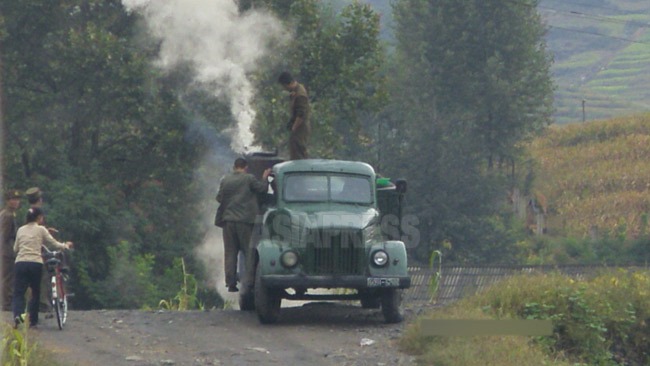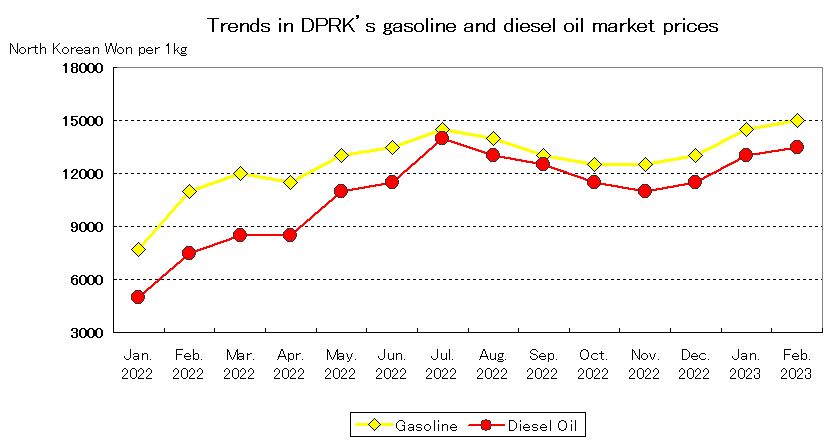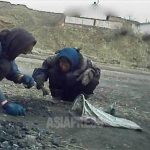
North Korean gasoline and diesel prices continue their march upwards. Compared to January of last year, gasoline has almost doubled in price, while diesel has increased by almost three-fold (by 2.7 times to be exact). The dramatic rise in international fuel prices due to Russia’s invasion of Ukraine is ending, so why are fuel prices continuing to increase in North Korea? (KANG Ji-won)
◆ The Kim Jong-un regime heavily controls fuel supplies
Fuel in North Korea is expensive, even compared to Japan or South Korea. For example, one liter of gasoline in South Korea purchased with cash cost KRW 1,580 as of late February, while diesel cost around KRW 1,560. In North Korea, one liter of gasoline cost KRW 1,820, while diesel cost KRW 1,615.
The international price of fuel rose steadily worldwide due to Russia’s invasion of Ukraine in February 2022; however, it began falling in June of last year. South Korean gasoline prices, for example, have fallen by KRW 558.
Why, then, are North Korea’s market prices for fuel still rising? A reporting partner in the northern part of the country told ASIAPRESS that “it is because the authorities have drastically limited the amount (of fuel) circulating in the market,” further explaining that:
“Supplies of fuel are under state control, but state-run fuel supply depots have sold fuel into markets, allowing anyone to buy it. There has also been a lot of corruption in the military and other government agencies, with people siphoning off fuel (where they can). As a result, it’s now become difficult to buy fuel at fuel supply depots. They don’t sell the fuel unless you have haengpyo, which are used by government agencies and enterprises.”
Haengpyo are akin to checks and are used by organizations to pay for goods or services.

◆ North Korea’s crisis in transporting strategic goods such as coal and fertilizer
In accordance with UN Security Council sanctions that were intensified in 2017, North Korea is allowed to import 90% less refined petroleum products than in 2016, for a total of 500,000 barrels per year.
To add to existing difficulties, the COVID-19 pandemic led to even more troubles for North Korea’s economy. The Kim Jong-un regime was forced to suppress private sales of fuel to ensure that enough of the valuable commodity was available for use by key organizations in the country.
In regards to this, the reporting partner told ASIAPRESS that “people who want to buy refined petroleum products with cash must rely more than ever on haengpyo purchased by agencies, and that’s the reason why (fuel) prices have risen.”
The rising cost of refined petroleum products creates major issues for the economy. Government agencies, state-run firms, and farms are suffering severe difficulties in transporting needed materials such as coal and fertilizer due to rising fuel costs.
For example, many collective farms in the country are promising a percentage of the fertilizer in advance to the people transporting it as a way to cover fuel costs needed to move the fertilizer in the first place. What this means, however, is that farms have less fertilizer to use in the fields.
※ ASIAPRESS communicates with reporting partners through Chinese cell phones smuggled into North Korea.
- How should we view Kim Jong-un’s daughter? The regime is looking to perpetuate the country’s one-family rule into a fourth succession ISHIMARU Jiro
- <Inside N. Korea> Poverty-stricken people gather in front of government and party headquarters in Yanggang Province to demand food
- <Inside N. Korea>Reflecting the DPRK’s economic difficulties, special gift for Kim Jong-il’s birthday amounts to just five hours of electricity… “Kids just got sweets to eat”
- <In-depth Investigation>N. Korea still boasts the world’s longest military service! This year, men are required to serve 8 years, while women volunteers are given 5 years
- <Inside N. Korea>Authorities begin recruiting poverty-stricken urban dwellers to move to farms with promises of food and housing

























